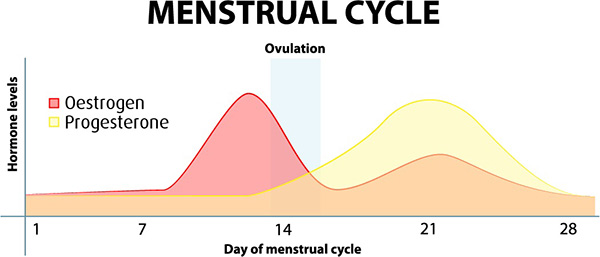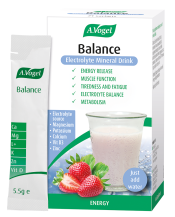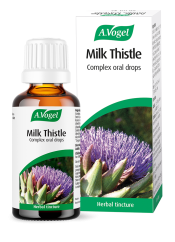How long does the average menstrual cycle last?
Your menstrual cycle is a very intricate process which requires your hormones to cooperate at just the right levels in order to trigger processes like ovulation and menstruation. Sex hormones oestrogen and progesterone are the main players in the menstrual cycle and each has an important role.
The average menstrual cycle lasts for 28 days, with the first day of your cycle corresponding with the day your period begins. On average, a period will last around 5 days. Then, on day 14 of your cycle, an egg is released from your ovaries and your body prepares for pregnancy. When this isn’t fertilised, your next period will begin approximately 14 days later, thus restarting the cycle again.

While this is how the average menstrual cycle works, some women find that their cycle is slightly longer or shorter than this, which can be perfectly normal. However, if you experience a change in your personal routine and notice that your menstrual cycle has changed quite dramatically, there could be a few reasons why.
Hormone imbalance
Some women suffer from an imbalance of hormones, wherein the ratio between oestrogen and progesterone is off-kilter, which puts them more at risk of suffering from nasty symptoms alongside their monthly period.
In some cases, a woman may experience oestrogen dominance, which means that her levels of oestrogen are higher than they should be in relation to progesterone. As a result, she might experience heavy, painful periods which come regularly: at least every 4 weeks, if not more. Oestrogen dominance is, therefore, often associated with a shorter menstrual cycle, as there is often less than 28 days between periods.
However, if you find that your menstrual cycle lasts longer than the average 28 days, this could mean that you have higher levels of progesterone relative to oestrogen, otherwise known as progesterone dominance.
Women with progesterone dominance might find that they have light periods which are less frequent and come less than once every 4 weeks. If you have to wait longer than 4 weeks for your next period to come, you might have a dominance of progesterone, especially if you suffer from the following symptoms each month:
- Weepiness and emotional mood swings
- Low energy levels and tiredness
- Skin problems like acne or dryness.
Top tip:
Keeping a diary or using a period-tracking app can help you get an idea of what is normal for your body and your own menstrual cycle. This can help you to note any adverse symptoms that crop up around the time of your period each month, as well as how often you experience bleeding. You can then take this to your doctor or practitioner if you are concerned.

What else can influence your cycle?
Peri-menopause
On average, women reach menopause around the age of 52, but it can happen as early as 35 or as late as the age of 60. As you approach the menopause, you can experience what is known as ‘peri-menopause’, lasting from the first signs of symptoms until a year after your last bleed.
During this time, your hormones can fluctuate and begin to drop as your reproductive abilities come to an end. So, although you might still experience periods during the peri-menopause, these can be irregular and sometimes heavy and painful. As a result, your menstrual cycle can be extended as you have to wait longer in between periods as your reproductive organs wind in anticipation of menopause.
Poor diet
If you aren’t feeding your body properly, all sorts of bodily processes may be interrupted, including your period. On the one hand, if you eat too much then this increases your risk of obesity and the associated health risks. Because oestrogen is produced in fat cells as well as the ovaries, an excess of fat can lead to higher oestrogen levels which, in turn, can interfere with other sex hormones and result in infrequent periods and an irregular menstrual cycle.

On the other hand, however, eating too little can also negatively impact your period and menstrual cycle. Without sufficient nutrients and energy sources, your body will struggle to carry out important functions, including menstruation.
If you are underweight, you might find that your periods become very short and light, or even stop altogether. This could make your cycle seem like it’s lasting even longer if you had a very light bleed the previous month or if you haven’t bled in over 28 days.
Top tip:
Eat a varied diet all month long! Make sure you’re getting plenty of vitamins and minerals from your diet and avoid indulging in fatty or sugary foods too often, as this can upset your hormone balance. Find out which vitamins and minerals you should be eating to get you through your period.
Stress
When you are stressed, your body responds by switching off unimportant processes, while sending blood to your brain and muscles in case you need to make a quick getaway from whatever it is that is causing you to feel stress.
So, reproduction might not be top of mind if you are going through a stressful time such as revising for exams or worrying over financial issues. As a result, your periods might become irregular and the length of your cycle could be altered.

My Top Tip: If you are struggling with stress, you can try Stress Relief Daytime which contains extracts of Valerian and Hops. It’s a great herb to have to hand if you have a number of commitments to keep up with, or you have important deadlines at work which are causing you to worry. If you are struggling with stress, you can try Stress Relief Daytime which contains extracts of Valerian and Hops. It’s a great herb to have to hand if you have a number of commitments to keep up with, or you have important deadlines at work which are causing you to worry.
|
Hormonal birth control
Taking hormonal birth control for the first time or switching over to a new method of hormonal contraception can, of course, influence your hormones. If you have recently begun a new round of hormonal contraception, it could take a few months for your hormones and periods to settle down. The same goes for if you have recently stopped taking birth control as, again, it may take some time for your hormones to settle.
This can mean that, some months, you might experience a longer or shorter cycle than normal. Talk to your doctor if you think your birth control might not be right for you, or if you have any concerns regarding hormonal contraceptives.
PCOS
Polycystic ovarian syndrome (PCOS) is thought to affect around 10% of women. PCOS can affect your insulin resistance and, thus, upset the ovaries’ release of the hormones which are necessary for ovulation and menstruation.
Because these processes can be interrupted, many women with PCOS will find that they have a longer menstrual cycle, with breaks of 28 days or more in between periods. What’s more, these periods tend to be heavier and more painful when they do eventually arrive, as the endometrial tissue has had extra time to thicken and build up and is, therefore, more difficult to flush out.
Top tip:
Molkosan is rich in L+ lactic acid so it can be a useful supplement when managing symptoms of PCOS which are associated with insulin resistance. L+ lactic acid can help to support the gut environment and feed the friendly bacteria in your gut which, in turn, can help with the metabolism of starches and sugars.










